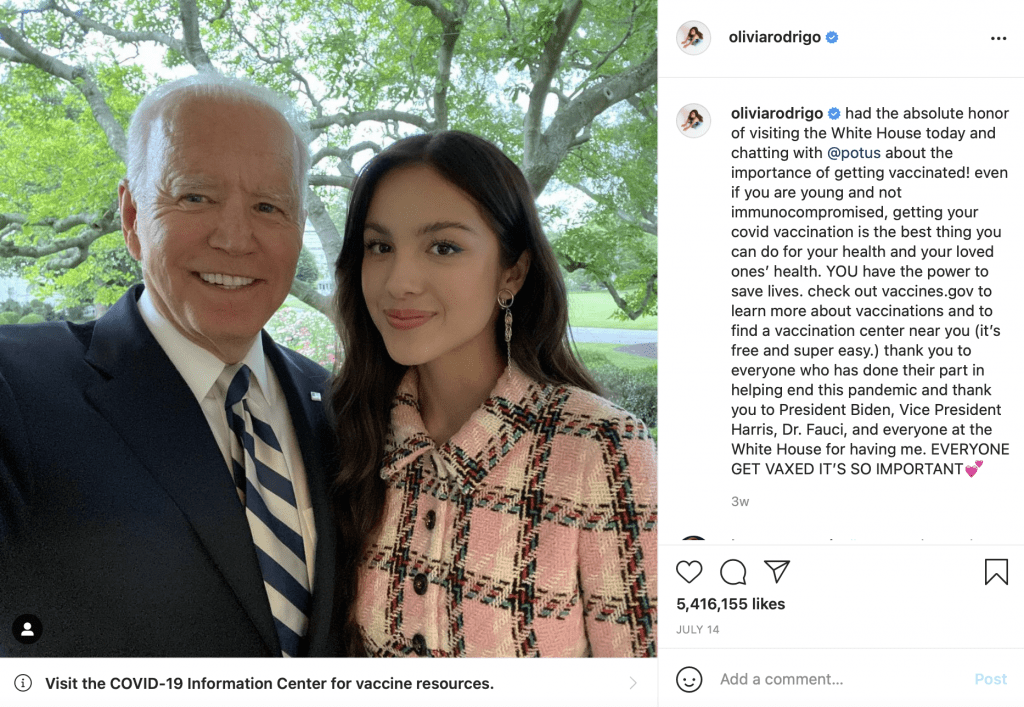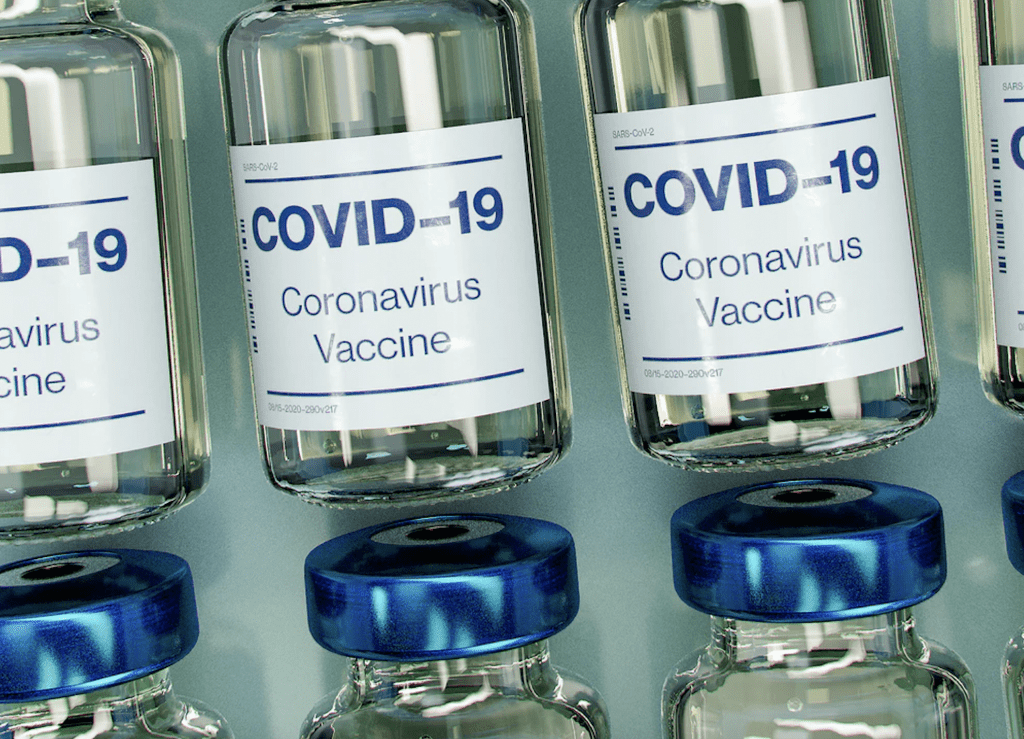Move over Revolve. The biggest influencer campaign of the moment is not pushing attire for previously-postponed weddings or for long-awaited Côte d’Azur holiday wardrobes. It is one that aims to persuade young Americans to get vaccinated. The New York Times revealed last week that the White House has enlisted more than fifty influencers – from heavily followed figures on gaming platform Twitch to those on TikTok, such as 17-year old creator Ellie Zeiler, who boasts upwards of 10 million followers – to help promote COVID-19 vaccinations. In furtherance of the broad social media push, influencers have shared question-and-answer sessions, and taken part in Instagram live events with the federal government’s top infectious disease expert and President Biden’s chief medical adviser Dr. Anthony Fauci, while singer Olivia Rodrigo paid a visit to the White House to call on young people to get vaccinated, and posted a selfie with the president with a similar message.
A couple of months before 18-year-old Rodrigo’s heavily-publicized visit (which was not only believed to help boost vaccination rates among teens but also led to a 200 percent spike in spike in searches for vintage Chanel, according to Lyst, a nod to the pink S/S 1995 Chanel suit that the star wore), President Biden and Dr. Fauci aimed to reach young Americans by hosting a YouTube town hall with make-up artist Manny MUA, animal expert channel Brave Wilderness, and beauty YouTuber Jackie Aina – who collectively boast some 28 million YouTube subscribers – to discuss vaccinations.
Still yet, the Times reports that as part of a larger effort, the White House has enlisted New York-based influencer-led creative agency Village Marketing and COVID vaccine campaign Made to Save for the specific purpose of enlisting influencers to back the cause.

Not the First Push of its Kind
While certainly noteworthy, the move is, however, not the first of its kind. In fact, it comes less than a year after the United Kingdom government opted to enlist influencers in promote a COVID-specific endeavor. Not unlike how department store chain Nordstrom hired a handful of established social media figures to spread the word about its safety measures in an attempt to lure consumers back not stores last year, the UK relied upon several social media influencers and reality television stars to help promote the National Health Service’s test and trace service, a system that aims to track contact that an individual who tests positive for COVID-19 has had in other to prevent further spreading of the virus.
When the NHS’s system failed to reach its target for the ninth week in a row last year, the government opted for a new strategy, and brought in Love Island stars Shaughna Phillips, Josh Denzel and Chris Hughes, to help encourage the public to take part in the service. Phillips, who has 1.5 million followers on her Instagram, posted a photo of herself, reminding her followers that “the best way for us all to get back to doing the things we love” is by getting tested for coronavirus. She alerted her followers that the NHS’s service is “totally free, quick and is vital to stop the spread of coronavirus.” Meanwhile, the World Health Organization has been relying on influencer marketing techniques of its own in order to promote coronavirus messaging since last spring.
Interestingly, the practice of looking to influential figures to help promote the public good, including by way of vaccinations, dates back much further that 2020 and the COVID-19 pandemic.
“The power of celebrity had been harnessed in vaccination campaigns many times,” according to Western Sydney University School of Business professors Michelle O’Shea and Sarah Duffy Lecturer, School of Business, and Patrick van Esch, a Senior Lecturer in Marketing at Auckland University of Technology’s Business School. Most famously, they point to Elvis Presley, who was enlisted to receive his polio vaccine, as documented by members of the press on the set of “The Ed Sullivan Show” in October 1956 “as a way of encouraging take-up among teenagers.”
In terms of the efficacy of these celebrity endorsements, O’Shea, Duffy, and van Esch say that research has shown that “celebrity endorsements can trigger biological, psychological and social responses in people that make them more trusting of what celebrities say and do,” which is precisely why brands regularly tap big-name figures to serve as the face of their brand and/or endorse their products – whether it be cologne or cars. That same type of response applies to celebrities’ “endorsement of health information,” the academics assert, noting that “neuroscience research supports these explanations, finding that celebrity endorsements activate regions in the brain involved in making positive associations, building trust and encoding memories.” In short: famous figures are able to sell … vaccination campaigns, included.
As for the parties involved in these campaigns, Frankfurt Kurnit Klein & Selz attorney Jordyn Eisenpress notes that “the Federal Trade Commission’s endorsement guides require clear and conspicuous disclosure of material connections (i.e., connections that are not reasonably expected by the audience that might materially affect the weight or credibility of the endorsement). ” In light of “the focus that the federal government has had on influencer disclosures over the last few years,” Eisenpress says that “it will be interesting to see whether the White House will require and enforce FTC-type disclosures here.”













